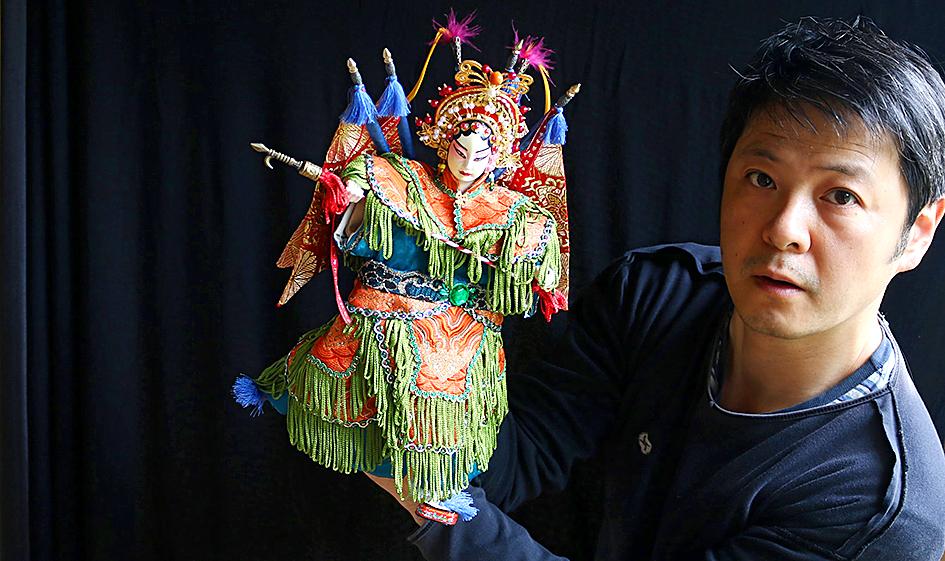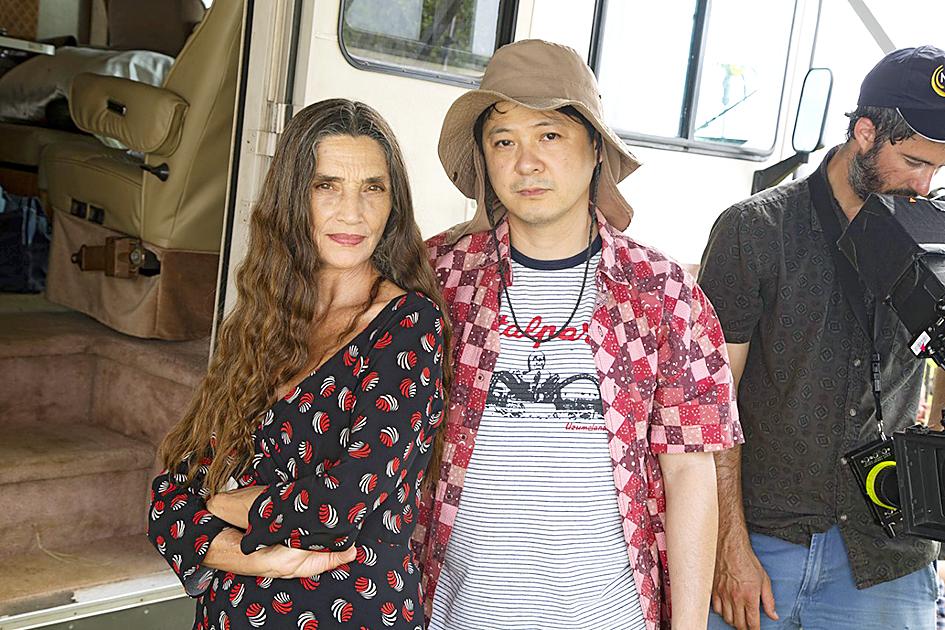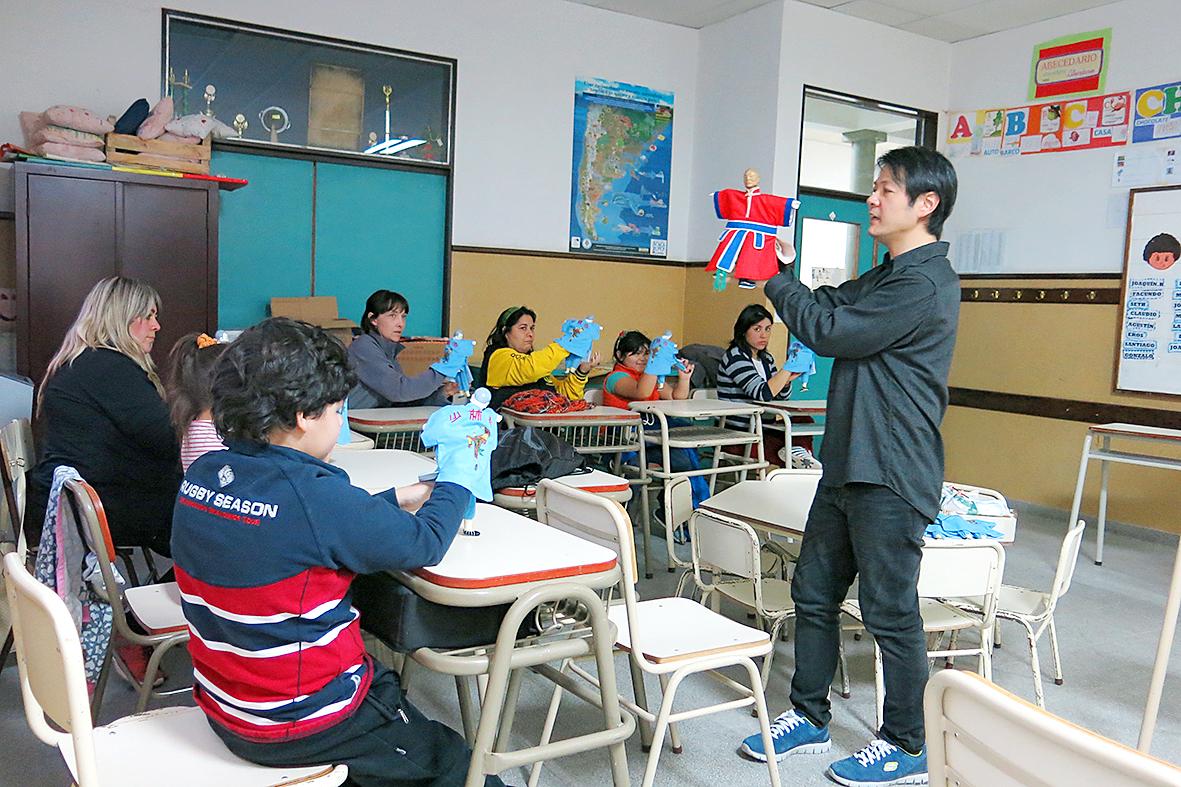Ignacio Huang (黃勝煌) is a puppet master. But unlike Argentina’s political operators, he doesn’t pull strings. “It’s glove puppetry,” says Huang of budaixi (布袋戲, traditional Taiwanese puppetry), which in recent years has replaced the big screen as his bread and butter.
Ahead of legislative elections in Argentina tomorrow, the two types of manipulation — physical and figurative — intersected last week, as Huang performed on Friday at a comedor — a lunch-providing school for disadvantaged children — paid for by the ruling Frente de Todos (Front for All) coalition, which controls the Buenos Aires Province legislature, and then on Sunday at a festival at Rosedal de Palermo park funded by the opposition Juntos Por El Cambio (Together For Change), which holds the balance of power in the city government.
Were the performances organized with the vote in mind?

Photo courtesy of Ignacio Huang
“Oh sure,” says Huang, who shot to fame in Latin America with a starring role in the 2011 comedy hit Un Cuento Chino (Chinese Take-away). “When there’s no election, nothing is given! It’s clientelism. This is the third world!”
Sandwiched between was another puppet-based event at a Chinese school organized by Taiwan’s Overseas Community Affairs Council (OCAC, 僑務委員會). This burst of activity followed 234 consecutive days of lockdown in Buenos Aires — the longest continuous confinement of any city.
“A month ago, they said ‘Now you can go out. The pandemic’s almost over,’” Huang says. “‘Everybody go out and work because the economy is dying!’”

Photo courtesy of Ignacio Huang
Having transitioned to remote work, Huang considers himself lucky. Bolstered by OCAC courses he took in Taiwan in 2018, Huang’s background in graphic design made online classes in Chinese arts and culture a good fit.
“I’ve always painted, so ink painting was natural for me,” he says. “I’m also teaching Chinese cooking.”
I express surprise. When we met in 2014, he was struggling with Taiwanese staples.

Photo courtesy of Ignacio Huang
“Ha, yes, you’re right, but I can cook well now,” he says. “I’m not a professional, but I’m an actor. I know how to bring joy to the classes, so the students love it.”
Still, he has missed the real thing. Noting that Argentinians are master rule-benders, he admits to sneaking in some street theater with a friend during lockdown.
“I took a train to a station where I knew there were no police and walked for about 40 blocks,” he says. “We threw a hat on the street and people put quite a lot of money in.”
TRIUMPHANT RETURN
On the cusp of COVID, things looked much rosier. In November 2019, Huang was shooting Charlotte, a comedy with legendary Spanish actress Angela Molina in Asuncion, Paraguay, where he lived for eight years after emigrating from Taiwan in the 1990s.
It was his first return in almost 30 years.
“I was excited to be back, and with a good reason: I went back famous!” he says. “When I left, I was nobody, and now here I am back in Paraguay, shooting a movie with a monster of cinema — Angela Molina!”
He caught up with teachers and classmates, including two close friends who have become well-known artists.
“They were all so proud of me,” he says. His old school was barely recognizable. “There was nothing left,” he says. Elsewhere, things were superficially different, but some scratching peeled off the veneer.
“When I left, there was no shopping,” he says. “Now there are lots of luxury shops but no one in them. And they don’t want anyone buying because they’re for money laundering!”
When shooting wrapped, Huang visited the Taiwanese embassy to get support for a puppet tour of Paraguay, including shows at the Biennial of Asuncion the following spring. Simon Franco, the director of Charlotte had previously contacted the embassy looking for “Chinese” extras, and Huang saw an opening.
“I wrote and said, ‘I’m a co-star of the movie and I’m Taiwanese,’” he says. “When they saw my brochures, they were very happy to help because I’m the only one doing Chinese puppets in Spanish in South America.”
CROSSING LINES
The embassy agreed to cover flights and hotels for Huang and fellow performers. In Ciudad del Este, which is renowned for its Taiwanese presence, and Encarnacion, Paraguay’s third city, Huang secured backing from community leaders for further shows. Then came COVID. Still, Huang is hopeful the shows can be rejigged for next summer’s biennial.
Charlotte finally premiered in Asuncion on Sept. 23 — the day theaters re-opened in the city. Travel restrictions prevented the main stars from attending.
Huang was the only actor at the January premier in Buenos Aires, where the film ran for a week at 50 percent capacity, before showing free online for another week. It was relatively well received by Argentina’s notoriously “cruel” critics, he says. It’s a curious film. Echoing Franco, Huang calls it a “soft comedy” that wasn’t selected for major film festivals because it “maybe wasn’t weird enough and didn’t have an important message.”
This assessment seems only partly right. There’s plenty of weirdness, but it’s often hard to see any justification for it. Huang agrees, referring to a cinematic trend toward nueva escritura (new writing). Noting that Franco’s two cowriters were “very young,” Huang compares the style to social media.
“They have all these lines crossing without any explanation — it’s something like Instagram,” he says. “All I can do is convince myself of why my character is doing something.”
EXOTIC OTHER
The appearance of a group of Taiwanese tourists flying a drone, which Huang’s character Lee purchases, is a baffling subplot.
“Franco didn’t know I was Taiwanese when he cast me,” says Huang. “But when he learned about Paraguay’s political connection with Taiwan, he gave that more visibility,” he adds, noting the prominence of the Republic of China flag in several scenes.
“But he treated the Taiwanese as something weird.”
This exoticizing of difference irks.
“Because we are ‘other,’ we have to reflect that they are normal, that they are beautiful, that they are correct; so we have to be incorrect, we have to be abnormal, we have to be weird,” he says “Why does my character have to eat cup noodles in every film? Can’t they come up with anything better?”
Yet, Huang believes Argentina has provided opportunities that were not available in Taiwan. Having attempted to make his mark during a year-long sojourn in 2017, he became disillusioned with the industry in his country of birth.
“Taiwanese just don’t need me, but in Argentina, I think I have a place,” he says.
With the ruling Peronist coalition poised to lose control of Argentine Senate for the first time in almost 50 years, Huang anticipates “deep change.” Despite, the uncertainty, he is upbeat. A puppet tour of Argentina’s coastal resorts is booked for February, and Huang is seeking funding for a Beijing Opera-influenced theater production that he is writing. These projects allow him to “escape the cage” and “give myself the characters I would like to do.”
As ever, his optimism is tempered by cynicism. Referring to a lawsuit against a group of former proteges who stole the puppets, sets and plays he had created, Huang puts the miscreants in the same bracket as the politicians.
“That’s Argentinians,” he says. “They are quite capable of the most shameless things.”

On April 26, The Lancet published a letter from two doctors at Taichung-based China Medical University Hospital (CMUH) warning that “Taiwan’s Health Care System is on the Brink of Collapse.” The authors said that “Years of policy inaction and mismanagement of resources have led to the National Health Insurance system operating under unsustainable conditions.” The pushback was immediate. Errors in the paper were quickly identified and publicized, to discredit the authors (the hospital apologized). CNA reported that CMUH said the letter described Taiwan in 2021 as having 62 nurses per 10,000 people, when the correct number was 78 nurses per 10,000

As Donald Trump’s executive order in March led to the shuttering of Voice of America (VOA) — the global broadcaster whose roots date back to the fight against Nazi propaganda — he quickly attracted support from figures not used to aligning themselves with any US administration. Trump had ordered the US Agency for Global Media, the federal agency that funds VOA and other groups promoting independent journalism overseas, to be “eliminated to the maximum extent consistent with applicable law.” The decision suddenly halted programming in 49 languages to more than 425 million people. In Moscow, Margarita Simonyan, the hardline editor-in-chief of the

Six weeks before I embarked on a research mission in Kyoto, I was sitting alone at a bar counter in Melbourne. Next to me, a woman was bragging loudly to a friend: She, too, was heading to Kyoto, I quickly discerned. Except her trip was in four months. And she’d just pulled an all-nighter booking restaurant reservations. As I snooped on the conversation, I broke out in a sweat, panicking because I’d yet to secure a single table. Then I remembered: Eating well in Japan is absolutely not something to lose sleep over. It’s true that the best-known institutions book up faster

Though the total area of Penghu isn’t that large, exploring all of it — including its numerous outlying islands — could easily take a couple of weeks. The most remote township accessible by road from Magong City (馬公市) is Siyu (西嶼鄉), and this place alone deserves at least two days to fully appreciate. Whether it’s beaches, architecture, museums, snacks, sunrises or sunsets that attract you, Siyu has something for everyone. Though only 5km from Magong by sea, no ferry service currently exists and it must be reached by a long circuitous route around the main island of Penghu, with the